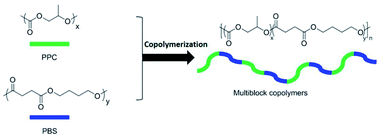Multiblock copolymers of PPC with oligomeric PBS: with low brittle–toughness transition temperature†
Abstract
In order to decrease the brittle–toughness transition temperature and increase the mechanical strength of poly(propylene carbonate) (PPC), a series of multiblock copolymers of poly(propylene carbonate)-multiblock-poly(butylene succinate) (PPC-mb-PBS) are designed and synthesized. 1H-NMR, DOSY and GPC results demonstrate the successful synthesis of PPC-mb-PBSs with designed multiblock sequence. The thermal, crystalline and mechanical properties of these PPC-mb-PBSs are evaluated by DSC, TGA, POM, tensile and tearing testing. Experiment results demonstrate that crystallinity, thermal and mechanical properties of PPC-mb-PBSs can be readily modulated by changing the composition and block length of PPC and PBS moieties. It is found that all the prepared PPC-mb-PBSs are semi-crystalline polymers with a melting temperature at 93–109 °C and a Tg at around −40 °C. Both crystallization rate and crystallinity of the multiblock copolymers increase with increasing both PBS content and PBS block length. As a consequent, the tensile strength increases with increasing PBS/PPC block ratios at room and lower temperatures. In conclusion, the amorphous PBS phase in the block copolymers acts as soft segment, endowing PPC-mb-PBS copolymers with much better flexibility than PPC at low temperature of 273 K when PPC segments are frozen.



 Please wait while we load your content...
Please wait while we load your content...